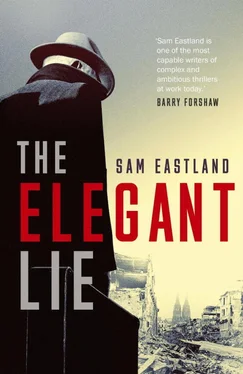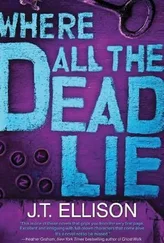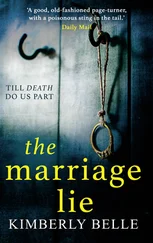‘I spotted you when you went into the alley,’ said Wilby, ‘and I was going to wait until you’d left before I checked the drop. But then I saw what happened and came running. Lucky for you.’
Carter told him about the meeting with Garlinsky, as well as Dasch’s plan to send him and Teresa into Czechoslovakia.
‘I hate to say it,’ said Wilby, ‘but I think Garlinsky is right. If the Russians find that money before you have a chance to destroy it, and if they figure out that he’s the one who made it, they’ll come after him and whoever he works for with everything they’ve got.’
‘Then shouldn’t you just let the Russians find it?’ asked Carter.
‘The problem,’ said Wilby, ‘is that they aren’t just going to blame Garlinsky. That money went down in a military plane. They’re going to convince themselves we are involved. And when that happens, they’re not going to sit back and do nothing. This kind of thing will be answered, and the Russians can be very heavy handed when it comes to that. We’re already in a war. It’s just a question of what kind of war we’re fighting. So far, we have managed to avoid firing artillery at each other, but this kind of thing could change that. You never quite know what straw is going to break the camel’s back.’
‘So what do you want me to do?’ asked Carter.
‘I want you to do exactly what Garlinsky said. Find the plane. Destroy it. Make sure there’s nothing left behind that could lead the Russians back to Dasch or Garlinsky, but not before you’ve gathered enough evidence to make sure we can track down Garlinsky ourselves.’
‘Shouldn’t you send in a team of experts for this?’
‘Of course, and if I had a month to set it up, or even a week, I might be able to do that, but we have less than twenty-four hours. Besides, if I pull you out now, it won’t take more than a few minutes for Dasch and Garlinsky to figure out you’re either on your way to the authorities or already working for them, and they’ll shut everything down and vanish in the wind and we’ll never find them again. It will be as if they had never existed, and everything you have suffered through to get this far will have been for nothing◦– less than nothing because of how close you got us to the truth. But if you follow through with what they’re asking, if you accomplish the task and make them think they’re in the clear again, you will have done for them what they could not do for themselves. And they will reward you for that.’
‘How?’
‘By opening doors you never knew existed and behind which you will see the true face of our enemy. An opportunity like this will never come again, and we cannot walk away from it.’
‘All right,’ said Carter, and he started to rise to his feet.
‘Not so fast,’ Wilby told him. ‘We’re not done here yet.’
‘What’s wrong?’ asked Carter, as he settled back into the dirt.
‘I can’t let you go without the approval of the station chief.’
It surprised Carter to hear Wilby say this. ‘I thought you were keeping this whole thing under wraps.’
‘I was,’ Wilby admitted. ‘Parts of it, anyway. And I told you why, as well. I don’t believe the station is secure.’
‘So what’s changed?’ asked Carter.
‘This isn’t the same mission we began. It’s too big to keep in the dark. So even if there’s a risk involved, it’s one I’ve got to take. That we have to take.’
I wonder if Eckberg was wrong about you, thought Carter. I wonder if I was, as well. And suddenly he wished he’d never doubted the man who crouched beside him in the dark. ‘So get the approval,’ he said.
‘It’s not that simple,’ replied Wilby. ‘The station chief is going to have questions, not all of which I can answer, and we don’t have time for me to act as go-between, relaying messages back and forth. That could take days, or even weeks.’
‘That train pulls out tomorrow evening.’
‘I’ll set up an emergency meeting for tomorrow morning at the safe house on Nassaustrasse. Do you remember the house number?’
‘One hundred and six.’
‘That’s it,’ said Wilby. ‘I’ll call the meeting for nine. In the meantime, don’t go back to your apartment. It’s not safe. Do you think you can bed down here for the night?’
Carter looked around. He could see stars through gaps in the roof. ‘It’s not exactly the Hotel Europa,’ he said.
‘I told you to enjoy that while you could.’ Wilby slapped him on the shoulder, then stood and headed for the gap in the wall.
‘Thank you,’ said Carter.
Those words stopped Wilby cold. He turned around. ‘That’s not something I expected to hear out of you.’
Carter shrugged. ‘It kind of surprised me as well.’
‘Don’t get all sentimental on me now,’ said Wilby. Then he slipped out into the street.
Carter glanced at his watch, but the crystal had been broken in the fight and it was no longer working. He took it off and put it in his pocket. It couldn’t be long until dawn. He felt the cold now, seeping in through the neck of his shirt and slithering down his back. A dusty, metallic odour filled Carter’s lungs, the same as in the house where Ritter had almost blown his brains out on the first day they met. What had Dasch called it? The smell of the war? Something like that. And he had been right. Once you smelled it, you never forgot what it was. And from then on it would always be there, lurking in your blood.
*
Carter woke to the sound of somebody slamming a door.
He opened his eyes.
It took him a moment to remember where he was.
The morning sun was shining on his face, streaming down in bolts through the lopsided mosaic of slate tiles which were all that remained of the roof in the ruined building where he’d spent the night.
Out in the street, people passed by on their way to work. Beyond them, he saw a barge making its way down the Rhine. Some of the people had stopped and were looking across the river at something.
Carter lifted himself up on one elbow. His joints felt stiff and the side of his body that had rested on the ground was numb with cold. He staggered to his feet and wandered about in the ruins until he came to a puddle of water. There, Carter tidied himself up as best he could, crouching down on his haunches and washing the dried blood from his face where the man in the alley had hit him. Then he wetted his hair and smoothed it back, combing it through with his fingers. He slapped the dirt off his clothes and made sure his buttons were fastened. There wasn’t much else he could do.
A moment later, he stepped out of the ruined building and joined the flow of people. A number were still looking out across the river and, when he followed their gaze, Carter could see a plume of black smoke rising from among the buildings on the other side of the Deutzer bridge.
‘What happened?’ Carter asked a man who was shielding his eyes from the sun with a newspaper so that he could get a better view.
The man turned to Carter. ‘Keine Ahnung,’ he replied. No idea.
‘It was a crash,’ said a woman. ‘Somebody told me there was an accident between a streetcar and a bus.’
‘That was bound to happen,’ said the man, ‘the way those streetcars race around.’
‘Could you tell me the time?’ asked Carter.
The man reached into his vest pocket and hauled out a pocket watch on a chain. ‘Twenty minutes past nine,’ he said.
Carter swore quietly, realising that he was already late for the meeting. He thanked the man and crossed the road, making his way as quickly as he could towards the bridge, where tramcars rushed by in both directions, punching the air as they swept past. The pedestrian walkway was jammed with people pushing bicycles and others who, still seeming half asleep, plodded unhurriedly towards their jobs.
Читать дальше











